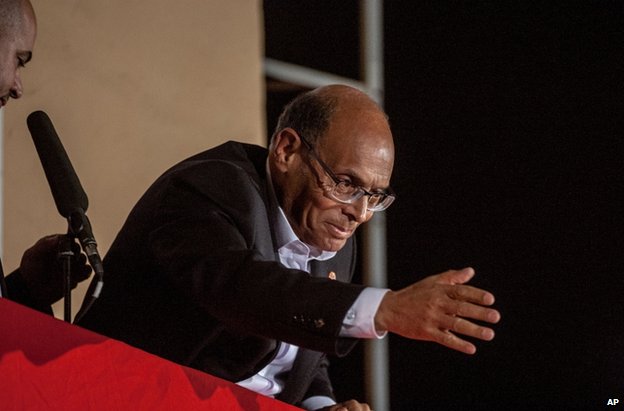Tunisia’s Beji Caid Essebsi is leading the exits polls with 55.5% of the vote in the Tunisia first free presidential election.
Supporters of the 88-year-old celebrated in the capital Tunis.
Campaigners for his rival, caretaker President Moncef Marzouki, say the results are too close to call.
Critics say his success marks the return of a discredited establishment but Mr Essebsi says he is a technocrat who will bring stability.
Tunisia was the first country to depose its leader in the Arab Spring and inspired other uprisings in the region.
Official results are still to be announced from the run-off election but one exit poll gave Mr Essebsi 55.5%, with several others showing similar figures.
Tunisia boosted security for the elections and closed border posts with Libya, which has been plagued by unrest.
A group of at least three attackers targeted a polling station near the city of Kairouan on Sunday morning. Security forces say they killed one attacker and arrested three.
 Supporters of Mr Essebsi took to the streets to celebrate
Supporters of Mr Essebsi took to the streets to celebrate Mr Essebsi appeared on a balcony at his party’s headquarters to claim victory
Mr Essebsi appeared on a balcony at his party’s headquarters to claim victory Mr Essebsi began his political career under Tunisia’s first post-independence leader, Habib Bourguiba
Mr Essebsi began his political career under Tunisia’s first post-independence leader, Habib Bourguiba Mr Essebsi’s supporters lit flares and fireworks after the polls closed
Mr Essebsi’s supporters lit flares and fireworks after the polls closed Claiming victory, Mr Essebsi dedicated it to the “martyrs of Tunisia”
Claiming victory, Mr Essebsi dedicated it to the “martyrs of Tunisia” The election is seen as a landmark in the country’s transition to democracy
The election is seen as a landmark in the country’s transition to democracyCoastal candidate
Mr Essebsi appeared on local television after polls closed on Sunday, saying, “I dedicate my victory to the martyrs of Tunisia.”
“I thank Marzouki, and now we should work together without excluding anyone,” he added.
Supporters danced and let off fireworks outside the headquarters of Mr Essebsi’s secular-leaning Nidaa Tounes party.
Mr Essebsi held office under both deposed President Zine el-Abedine Ben Ali and Tunisia’s first post-independence leader, Habib Bourguiba.
He won the first round of voting last month with 39% of the vote.
He is popular in the wealthy, coastal regions, and based his appeal to voters on stability and experience.
‘Unfounded’ claim
A spokesman for Mr Marzouki said the victory claim was “without foundation”.
Mr Marzouki is a 67-year-old human rights activists forced into exile by the Ben Ali government.
He has been interim president since 2011 and is more popular in the conservative, poorer south.
 Moncef Marzouki is a former exile
Moncef Marzouki is a former exileAfter casting his ballot, Mr Marzouki said Tunisians “should be proud” of themselves “because the interim period has come to a peaceful end”.
Mr Marzouki was thought likely to attract support from the moderate Islamist Ennahda party, which has played a key role in Tunisian politics since the Arab Spring but did not field a candidate.
Whoever wins faces restricted powers under a constitution passed earlier this year.
The president will be commander-in-chief of the armed forces but can appoint or sack senior officers only in consultation with the prime minister.
The president will also set foreign policy in consultation with the prime minister, represent the state and ratify treaties.
FRENCH VERSION

Les partisans de l’âgé de 88 ans a célébré dans la capitale Tunis.
Les militants de son rival, le gardien Président Moncef Marzouki,disent que les résultats sont trop proches pour appeler.
Critiques disent que son succès marque le retour d’unétablissement discrédité, mais Monsieur Essebsi explique qu’il estun technocrate qui apportera la stabilité.
La Tunisie a été le premier pays à déposer son chef de file dans leprintemps arabe et inspiré d’autres soulèvements dans la région.
Résultats officiels sont encore à être annoncé depuis l’élection deruissellement, mais un sondage sortie des urnes a donné M.Essebsi 55,5 %, avec plusieurs autres montrant des chiffressimilaires.Tunisie boosté la sécurité pour les élections et les postesfrontière fermée avec la Libye, qui a été en proie à des troubles.
Un groupe d’au moins trois assaillants visant un bureau de voteprès de la ville de Kairouan le dimanche matin. Les forces desécurité se disent tué un attaquant et trois arrêtés.Candidatcôtière

« Je remercie Marzouki, et maintenant nous devrions travaillerensemble, sans exclure personne, » a-t-il ajouté.
Partisans dansaient et déclencher des feux d’artifice devant lesiège du parti de M. Essebsi laïque Nidaa Tounes.
Monsieur Essebsi tenue Bureau sous les deux destitué le PrésidentZine el-Abedine Ben Ali et de la Tunisie premier chef après l’indépendance, Habib Bourguiba.
Il a remporté le premier du scrutin le mois dernier avec 39 % dessuffrages.
Il est populaire dans les régions côtières riches et fondé son appelaux électeurs sur la stabilité et l’expérience.
Réclamation de « Sans fondement »
M. Marzouki est qu’un homme de 67 ans droits militantscontraints à l’exil par le gouvernement de Ben Ali.
Il a été Président par intérim depuis 2011 et est plus populairedans le sud conservateur et plus pauvre.
Moncef Marzouki accueille les partisans à Tunis, 21 décembre
Celui qui gagne les visages des pouvoirs restreints sous uneconstitution adoptée plus tôt cette année.
Le Président sera commandant en chef des forces armées maispeut nommer ou limoger des officiers supérieurs qu’enconsultation avec le premier ministre.
Le Président également définir la politique étrangère enconsultation avec le premier ministre, représentera l’État et ratifierdes traités.


